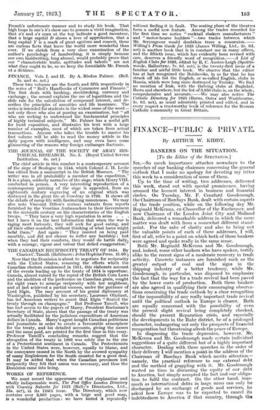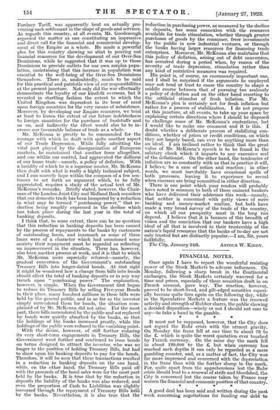FINANCE-PUBLIC & PRIVATE.
By ARTHUR W. KIDDY.
BANKERS ON THE SITUATION. [To the Editor of the SPECTATOR.] SIR,—S0 much importance attaches nowadays to the speeches of our banking chairmen concerning the general outlook that I make no apology for devoting my letter this week to a consideration of some of them.
Up to the time of writing, two addresses, delivered this week, stand out with special prominence, having aroused the keenest interest in business and financial circles. On. Tuesday, Mr. F. Craufurd Goodenough, the Chairman of Barclays Bank, dealt with certain aspects of the trade position, while on the following day Mr. Reginald McKenna, ex-Chancellor of the Exchequer, and now Chairman of the London Joint City and Midland Bank, delivered a remarkable address in which the same matter was dealt with from a somewhat different stand- point. For the sake of clarity and also to bring out the valuable points of each of these addresses, I will, first of all, refer to a point on which both of these bankers were agreed and spoke really in the same sense. Both Mr. Reginald McKenna and Mr. Goodenough, and, indeed, some other bankers who have spoken, testify alike to the recent signs of a moderate recovery in trade activity. Concrete instances are furnished such as the greater output of coal and the signs in the shipping industry of a better tendency, while Mr. Goodenough, in particular, was disposed to emphasize the fact that the way for a trade revival had been paved by the lower costs of production. Both these bankers are also agreed in qualifying their encouraging observa- tions concerning the trade outlook by a clear recognition of the impossibility of any really important trade revival until the political outlook in Europe is clearer. Both are equally concerned with the possibility of even the present slight revival being completely checked, should the present Reparation crisis, and especially the developments in the Ruhr district, be of a prolonged character, endangering not only the prospects of financial recuperation but threatening afresh the peace of Europe. In diagnosing the trade depression, however, Mr. McKenna and Mr. Goodenough made certain individual suggestions of a quite different but of a highly important character. Dealing with these speeches in the order of their delivery I will mention a point in the address of the Chairman of Barclays Bank which merits attention— namely, the practical reference to our external debt and the method of grappling with it. Mr. Goodenough wasted no time in discussing the equity of our debt to America, but simply accepted the fact and our obliga- tion to fulfil the contract. On the other hand, inas- much as international debts in large sums can only be discharged by an exchange of goods and services, he asked how Europe was to be expected to cancel its indebtedness to America if that country, through the Fordney Tariff, was apparently bent on actually pre- venting such settlement in the shape of goods and services. As regards this country, at all events, Mr. Goodenough regarded the matter as one constituting an impressive and direct call for the financial and commercial develop ment of the Empire as a whole. He made a powerful plea for this country showing no stint in pouring out financial resources for the development of our Over-Sea Dominions, while he suggested that it was up to those Dominions to provide outlets for our own surplus popu- lation, maintaining that this increase in population was essential to the well-being of the Over-Sea Dominions themselves. There is, undoubtedly, much to be said for this practical and patriotic view of our responsibilities at the present juncture. Not only did the war effectually demonstrate the loyalty of our kinsfolk overseas, but it revealed in startling fashion the extent to which. the United Kingdom was dependent in its hour of need upon foreign countries for the very means of subsistence. Moreover, by developing our Empire resources, we tend at least to lessen the extent of our future indebtedness to foreign countries for the purchase of foodstuffs and so on, and indirectly the effect would also be to in- crease our favourable balance of trade as a whole.
Mr. McKenna is greatly to be commended for the courage with which he dealt with quite another aspect of our Trade Depression. While fully admitting the vital part played by the disorganization of European markets, he maintained that another force altogether, and one within our control, had aggravated the dullness of our home trade—namely, a policy of deflation. With a lucidity of which he is a supreme master, Mr. McKenna then dealt with what is really a highly technical subject, and I can scarcely hope within the compass of a few sen- tences to set forth an argument which, to be fully appreciated, requires a study of the actual text of Mr. McKenna's remarks. Briefly stated, however, the Chair- man of the London Joint City and Midland Bank considers that our domestic trade has been hampered by a reduction in what may be termed " purchasing power," that re- duction being roughly expressed in the decline which has taken place during the last year in the total of banking deposits. I think that, to some extent, there can be no question that this reduction in banking deposits has been caused by the process of repayments to the banks by customers of outstanding loans, and inasmuch as some of these loans were of a character which had occasioned some anxiety their repayment must be regarded as reflecting an improvement in the situation. There has, however, also been another process at work, and it is that to which Mr. McKenna more especially referred—namely, the gradual conversion of the Government's outstanding Treasury Bills into longer-dated bonds. At first sight it might be wondered how a change from bills into bonds should affect the total of banking deposits or in any way trench upon " purchasing power." The explanation, however, is simple. When the Government first began to reduce its Treasury Bills by selling Five-year Bonds in their place, many hundred millions in these bills were held by the general public, and in so far as the investor simply surrendered them for bonds, the situation com- plained of by Mr. McKenna did not arise. For the most part, those bills surrendered by the public and not replaced by bonds were quietly absorbed by the banks, so that the holdings of the banks increased greatly, while the holdings of the public were reduced to the vanishing point. With the desire, however, of still further reducing its very short-term engagements in Treasury Bills, the Government went further and continued to issue bonds on terms designed to attract the investor, who was no longer in the position of holding Treasury Bills, but had to draw upon his banking deposits to pay for the bonds. Therefore, it will be seen that these transactions resulted in a reduction in banking deposits on the one hand, while, on the other hand, the Treasury Bills paid off with the proceeds of the bond sales were for the most part held by the banks. It is true that by the reduction in deposits the liability of the banks was also reduced, and even the proportion of Cash to Liabilities was slightly increased through the repayment of Treasury Bills held. by the banks. Nevertheless, it is also true that the reduction in purchasing power, as measured by the decline in deposits, has some connexion with the resources available for trade stimulation, whether through greater purchases of goods by the consumer, freer investments by the public in new industrial ventures, or through the banks having larger resources for financing trade enterprises. Moreover, Mr. McKenna also maintains that this policy of deflation, arising out of debt conversion, has occurred during a period when, by reason of the severity of trade depression, stimulation rather than any kind of restrictive measures was. required. His point is, of course, an enormously important one, and I shall be surprised if the arguments he employed may not tend at least to cause the country to shape a middle course between that of pursuing too zealously a policy of deflation and on the other hand resorting to the artificial stimulus of fresh inflation. For Mr. McKenna's plea is certainly not for fresh inflation but rather for a process of stabilization. I do not propose at this juncture, at all events, to take up your space by explaining certain directions where I should be disposed to challenge some of Mr. McKenna's contentions, but I would like to make one comment and it is this. I doubt whether a deliberate process of stabilizing con- ditions, whether of prices or credit conditions, on which they are largely based, can ever be anything more than an ideal. I am inclined rather to think that the great value of Mr. McKenna's speech is to be found in the salutary check which it imparts to any excessive zeal of the deflationist. On the other hand, the tendencies of inflation are so constantly with us that in practice it will, I believe, be a case of action and reaction ; in other words, we must inevitably have occasional spells of both processes, leaving it to experience to reveal when excesses are being committed in either direction. There is one point which your readers will probably have noted is common to both of these eminent bankers who have delivered their addresses this week—namely, that neither is concerned with petty views of mere banking and money-market routine, but both have made a very broad survey of the trade of the country, on which all our prosperity must in the long run depend. I believe that it is because of this breadth of vision and the conviction that our bankers have a high ideal of all that is involved in their trusteeship of the nation's liquid resources that the banks of to-day are not only trusted but are distinctly popular.—I am, Sir, yours faithfully,











































 Previous page
Previous page